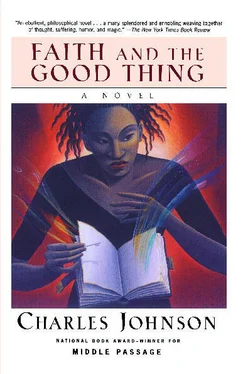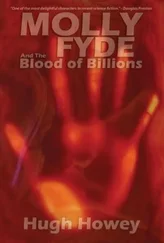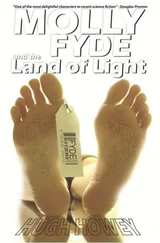An old woman in a black bonnet and black shawl began to dance. To Faith she danced the way a snake writhed or maybe like something dead but newly risen — like something that had no business dancing at all. She snapped back her head and stepped a mad cakewalk through the aisles, screaming. Magnus smiled. “All that is given to man, to life and to this illusion is stolen from God. Who shall you serve? If Him, your salvation is assured. If the world. ” Magnus chortled so deep, so strange that it sounded like the earth moving and stiffened all who heard, “. woe unto you who would dare to love this world.”
None would dare.
So the congregation thumped their feet in loud tattoos along the ground, clapped their hands, and called out. Air in the tent grew dense with dust, cries and smells released from the gathering. Distance between their bodies dissolved until all the raised voices in the tent echoed inside Faith’s head. Inching slowly through the tent, Reverend Brown sought prey — the proud. He laid his fingertips on Eula May Jenkins’s temples, lifting the big woman like a puppet. She quaked, shouted, screamed, and fell at Faith’s feet.
Lavidia gestured to Eula May’s empty seat. “You sit here by Alpha.” Alpha’s shirt was torn away, his chest was the color of fire. There, Faith did not want to sit. She backed away, aware of a sickness springing at the pit of her stomach, a stinging in her arms and legs. Seeing Faith and Lavidia, Reverend Brown spun on his heels and, from across the room, pointed his finger like a revolver at Lavidia. She froze, trembling once as if cold or being crushed by a great, invisible palm; then she left her seat, tearing at her throat. She collapsed, flailing the air. Faith went to her, tried to pin her arms and legs to the ground.
It was useless.
Faith’s dark reflection sparkled in Lavidia’s wide eyes; but her mother could not see. Lavidia’s wig, golden in the lights strung overhead throughout the tent, burst from its pins. Veins corded in her neck. Beside Faith, knifing through the riot of the hymns and loud tambourines, she heard Reverend Brown whispering:
“Are you ready, child?”
Dark and triumphant, Brown’s face was a mask of moving, proud expressions. He touched her arm and something inside Faith broke free. She tried to inhale, but the air was swirling, thick and weighted with invisible things. On her tongue strange words formed, and more vividly than before she saw her father’s swinging feet as retribution for his terrible pride and passions.
“Call!” Brown demanded.
Pain rippled like electricity through her limbs, so intense she wanted to leap, to avoid it, from her skin. “Call,” Brown whispered. “Say ‘Thank You,’ child.” It meant nothing to her. She would have said anything to extinguish the pain inside her. There on the ground, the earth at her ear humming with voices in the air, she saw it clearly — all the possible number of things in space, all forms that had ever existed in time reflected back into time like a man’s image trapped in a room of mirrors — she, herself, Faith Cross, fading back and forth on the continuum of time until she could no longer be certain of the images of herself that shone in her father’s eyes; those of Lavidia, the preacher, the undertaker, and Alpha were more real than she, if in that crazy complex of images she existed at all. Faith screamed it—“Thank Yooou!”—sang it—“Thank You!”—and finally believed in its healing grace—“Thank You!”
But it didn’t last. The silent kitchen said so. And so did the yard beyond.
She glanced over her shoulder at Reverend Brown, wondering if he knew how short-lived had been her salvation. An afterglow that warmed her and dissolved her intimations of a ghastly world without meaning or sense, save salvation and survival, had carried her through the remainder of her childhood. Time, though, did damage to it. For it often took the form of a hunger unsatisfied by further prayer meetings. Always these feelings possessed her, as a demon or jinni might, haunting her experiences to find a vision of complete freedom. It took in breaths beneath her own, moved with her limbs. Demanded its rights.
Sometimes she tried to ignore it, to grow up like other children. Ignoring it, though, was somehow akin to trying to forget one’s own heartbeat; louder it grew with denial. Like a lover or lecher, the awareness came to her at night when she tried to sleep, stealing through her bedroom window like the scent of night-blooming flowers or the whispering rustle of wind in the trees. When it came, the world as it usually appeared. disappeared. Time was suspended, and tomorrow took its true form as illusion. Only the present was immediate and everywhere, disclosed to her as the miraculous — woven veins in a browning autumn leaf, in the minor miracle of an insect nature had fashioned like a twig — with legs!
Clearest were these feelings on the afternoons she spent spooning with Alpha Omega Jones, her first and, she often thought, last love. It was more than a run-of-the-mill high-school affair; she was certain! Together they would lie in the tall grass, holding each other until their in and out breaths coincided, breathing as a single body; her shorter breaths would slowly slip beneath his own. And the grass and trees, it seemed, would bring their pulsations in line with them until the universe was a single heartbeat. Reality was a dream, or sometimes a nightmare, but no more than this: a rhythm. She felt herself at such times carried through the world as though she had wings, but not toward Glory, never toward Glory. Only back to earth, deep within its strange fabric. No personalities existed in such a pure world of feeling, just flashes of human outlines in the quilt of creation where plants had their place, and animals — all coexisting peacefully, lyrically, like notes in a lay.
“Well?” Reverend Brown said, removing his hands from her shoulders. “You and your mother both had it for a while. You can have it again.”
Faith looked away. “I felt something back then, but I don’t think that’s what Momma meant.” She looked at him timidly, almost afraid to say more. “I think Momma meant something like it. only more.”
“More?” Brown grumbled, and again, “ More? ” as though the word were bitter. He stepped close to her, intimidating her with his size as his hands flexed at his sides. “What more is there? Honey, the world is just the way you saw it on the floor of that tent — there ain’t no more — there couldn’t be! People who look for more will be annihilated.”
“She meant some thing,” Faith insisted.
The reverend cleared his throat and towered over Faith, drumming his fingers on the tablecloth. “Sometimes family deaths can be disruptive. They take away someone who’s been the center of your world for a long time, and you see how difficult it is to live without someone or something to hold on to. Death ought to start a person thinking—”
“. About what the good thing really is?”
Brown’s fist crashed on the table; Lavidia’s pipes spilled from their rack. He glared at them, then at Faith. “Don’t interrupt me! I’m trying to tell you something!” The reverend’s lips curled back over silver-capped teeth, his brow wrinkled. Faith immediately wanted to take back what she had said. Brown had taken it personally. Bitterness laced his voice:
“I ain’t gonna preach sin to you. There’s more involved than that! Your momma, God rest her soul, was tryin’ to tell you on her deathbed that you’ve got to have somethin’ to hold on to now that she’s gone. somethin’ that’ll pull the world together.” Brown, Faith sensed, was no longer talking to her, but to himself, slamming his left fist repeatedly into his right palm and pausing for reflection. “This world we live in — it’s like a shadowy cave fulla crazy sounds if you’ve got nothin’ to light it up. There’s no sun but the Saviour, y’see? There’s no right or wrong, and nothin’s clear-cut — there’s nothin’ but a lot of empty things that keep bumpin’ into each other in the dark. ”
Читать дальше












